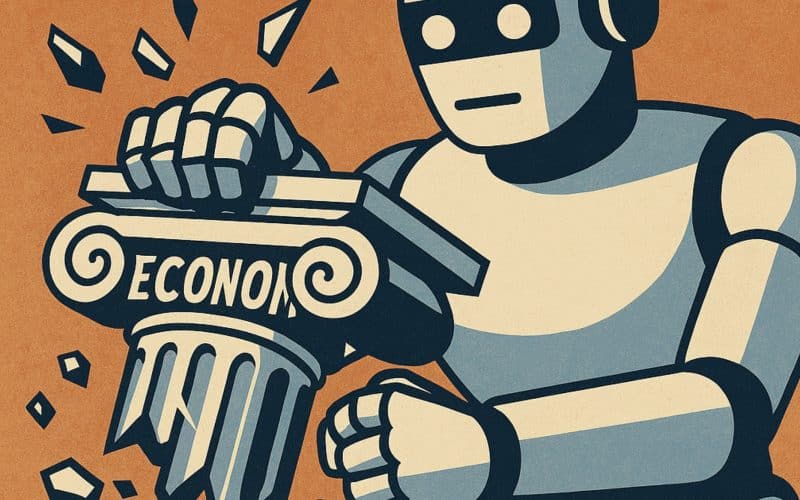
In a video interview – which you can view below – Tech investor Marc Andreessen claims artificial intelligence is on track to “make everything so cheap, it’ll break the economy.” In another interview OpenAI CEO Sam Altman agrees that AI is not just a new technology – it’s a force that will rewrite how societies function. Their combined visions suggest a future where jobs, wealth, and power are radically redistributed.
In this article we will go deeper into the interviews both Marc Andreessen and Sam Altman gave, explaining the paradoxes, the risks, and the once-in-a-generation opportunities that come with AI’s economic acceleration.
- 1 Marc Andreessen: AI Will Make Everything Cheap, Perhaps Too Cheap for Capitalism
- 2 Productivity Will Skyrocket, but So Will Job Disruption
- 3 Welcome to the Age of AI-Driven Inequality – or Shared Abundance?
- 4 Deflation-Friendly Investing: What Will Hold Value?
- 5 Sam Altman: AI Will Not Destroy Society
- 6 Policy Choices Now Will Define the Next Century
- 7 Act Fast, But Act Wisely
Marc Andreessen: AI Will Make Everything Cheap, Perhaps Too Cheap for Capitalism
Andreessen argues that AI will collapse prices not just for digital goods but also for physical products. “Everything” means manufacturing, logistics, education, healthcare – even legal advice. With language models now designing software, generating images, and writing reports, the marginal cost of many tasks drops to nearly zero.
But ultra-cheap goods lead to economic instability:
- Consumers delay purchases, expecting lower future prices.
- Producers suffer evaporating profit margins.
- Investment strategies fail, especially those based on inflation hedging.
This is a classic deflationary spiral, but now powered by algorithms instead of central banks.
Productivity Will Skyrocket, but So Will Job Disruption
AI is already replacing work once thought immune to automation:
- Software engineers use AI to write code.
- Designers use generative tools to produce ads, logos, and videos.
- Analysts and consultants use AI to draft reports in seconds.
According to OECD and multiple national AI surveys, creative, cognitive, and technical jobs – from marketing to finance – are being restructured first, not last.
Altman confirms: “I thought AI would come for blue-collar work first. I was wrong. It’s replacing cognitive and creative tasks right now.”
The result? A redefinition of work:
- Traditional jobs are decomposed into tasks, many of which AI can handle.
- New hybrid roles emerge: AI trainers, human-AI orchestrators, policy designers.
- But many workers will struggle to reskill fast enough, risking long-term exclusion.
Altman and Andreessen diverge on the outlook, but both flag the same structural risk: inequality at scale.
Andreessen warns of regulatory capture – where a small group of AI firms form cartels under the guise of “safety,” locking out competition and innovation. Altman also highlights the need for broad-based access to AI systems and even proposes shared ownership models where every person has a stake in AGI development.
But there are real dangers:
- If AI remains centralized, productivity gains flow to a few firms or states.
- If training data or infrastructure is monopolized, competition dies.
- If benefits are not shared, political backlash will intensify.
Andreessen predicts a shake-up of housing and infrastructure markets:
- Rural land may rise in value as AI-powered remote work decouples income from geography.
- Urban real estate may stagnate as fewer knowledge workers cluster in cities.
- Energy infrastructure becomes a strategic asset, since AI systems require enormous electricity inputs.
For context: a single generative AI query may use 5 to 10 times more energy than a Google search. If current trends continue, AI systems could consume up to 3% of global electricity by 2030.
Deflation-Friendly Investing: What Will Hold Value?
In an AI-deflationary world, traditional inflation-hedged assets like commodities or city real estate may lose value.
Instead, expect strong performance from:
- AI infrastructure stocks (semiconductors, data centers, cloud providers)
- Rural land and logistics hubs
- Companies that help humans coordinate with AI – in law, education, healthcare, and entertainment
Andreessen advises the following: “The wealth-building rulebook is being rewritten. Human expertise in orchestrating AI becomes premium.”
Sam Altman: AI Will Not Destroy Society
Sam Altman counters the dystopian narrative by calling for shared optimism and strategic caution:
- We are not headed for mass unemployment but for labor realignment.
- Every writer, scientist, or artist could have “a thousand AI assistants.”
- The bottleneck will not be intelligence – it will be values, governance, and trust.
He also refutes the fear that AI will “kill us all”: “These are machines we build. If we’re smart, we’ll build systems that reflect collective human preferences.”
Yet Altman acknowledges the psychological shock that comes with rapid transition: “Even if the future is better, the loss of today’s norms and jobs will feel destabilizing.”
Policy Choices Now Will Define the Next Century
Both leaders agree that the decisions made in 2025–2030 will define not just markets but entire political systems.
They see three key crossroads:
- Regulation: Will governments enable open ecosystems or protect incumbents through red tape?
- Ownership: Will access to foundational AI models be equitable or restricted to a few?
- Global competition: Will democracies keep pace with China’s state-backed AI acceleration?
Failure to act wisely could result in a repeat of 20th-century monopolies, only more powerful and less accountable.
Act Fast, But Act Wisely
Artificial intelligence will not pause. It will change everything – from how people earn, to where they live, to what governments regulate. The question is whether society can adapt its rules fast enough to prevent collapse while steering toward shared prosperity.
The next economy will not be built on scarcity – it will be built on abundance, coordination, and adaptability.
